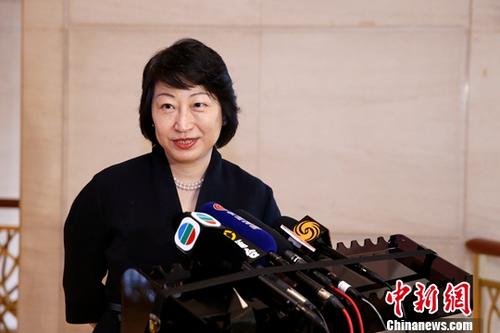China News Service, Hong Kong, December 9th (Reporter Suo Youwei) The Liaison Office of the Central People's Government in the Hong Kong Special Administrative Region and the Office of the Special Commissioner of the Ministry of Foreign Affairs in the Hong Kong Special Administrative Region jointly held a symposium on the 9th with the theme of "seeing the true meaning of democracy, strengthening democracy and self-confidence" meeting.
The Secretary of Justice of the Hong Kong Special Administrative Region Government, Zheng Ruohua, told reporters from China News Agency on the main theme of the forum that improving the electoral system is an important milestone in Hong Kong’s democratic electoral system. It has practiced broad representation, political tolerance, balanced participation and fairness. Competitiveness has enabled the implementation of the policy of "patriots ruling Hong Kong" and allowed "one country, two systems" to proceed steadily and far.
Zheng Ruohua pointed out that sovereign equality is a basic practice in international relations and a basic principle of international law.
The Charter of the United Nations clearly stipulates the principle of sovereign equality, and the principle of non-interference is also the core concept of sovereign equality. The declaration adopted by the UN General Assembly in 1970 clearly stated that "No country or group of countries has the right to directly or indirectly for any reason. Interference in the internal affairs or foreign affairs of any other country. Therefore, armed intervention involving all other forms of intervention or threats to a country’s personality or its political, economic and cultural elements is a violation of international law.” A copy of the International Court of Justice in 1986 The judgment also reaffirmed that the principle of non-interference is part of international customary law.
Data map: Zheng Ruohua.
Photo by China News Agency reporter Han Haidan
Zheng Ruohua said that the formulation and maintenance of the constitutional order belong to the central authority. This is the basic principle of national sovereignty and the practice of all countries in the world.
The central government exercises its sovereignty to improve the electoral system of the Hong Kong Special Administrative Region. It has a solid legal foundation and is purely an internal affairs of the country.
The United Nations General Assembly has repeatedly mentioned in its resolutions that "there is no single model of democracy, and democracy does not belong to any country or region."
According to the principles of the European Court of Human Rights, any country has its own unique history, cultural differences and different political backgrounds, and each country has the right to establish or perfect a democratic system according to its own circumstances.
Other countries have no right to impose their systems on other countries and interfere in the internal affairs of other countries.
She continued to point out that the United States is still stubborn and blatantly conspiring with anti-China chaos in Hong Kong to slander the Central Government and the SAR, attempting to interfere in the internal affairs of the country and the SAR, blatantly violating the basic principles of international law and undermining the spirit of the rule of law.
Any society that respects the rule of law has the responsibility to condemn such acts and should not allow these unruly acts to continue.
"I once again call on all registered voters to vote enthusiastically on December 19, so that those who are truly aspiring to serve the community will seek the well-being of Hong Kong citizens," she said.
(Finish)

